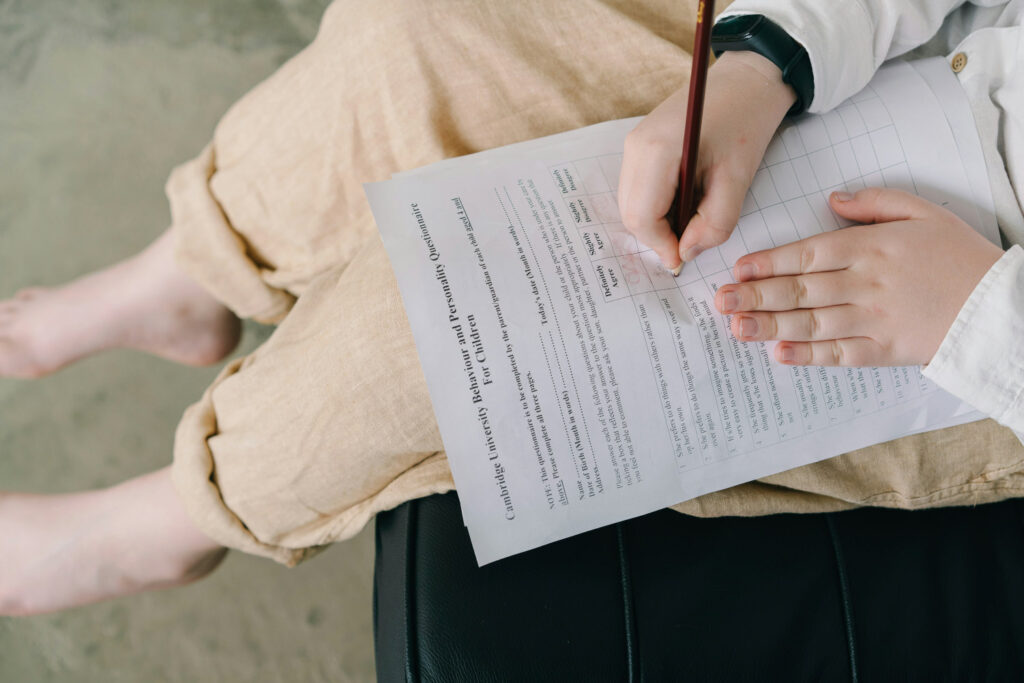New Jersey
Psychoeducational Testing
Psychoeducational Testing is a comprehensive evaluation process that we offer at Behaved Brain Wellness Center which assesses a child’s cognitive, academic, and emotional functioning. This form of assessment is widely used in schools and therapeutic settings to identify learning disabilities, cognitive strengths and weaknesses, and emotional or behavioral challenges that may impact academic performance. With this information, our team works with the child’s school system to develop and implement a customized IEP or other modified leaning curriculum to optimize the child’s education and learning environment.
What Is
Psychoeducational Testing

Psychoeducational testing involves a series of standardized assessments that measure different aspects of a child’s development, including:
- Cognitive abilities to test IQ, memory, and problem-solving skills. The intelligence test results are best seen as predicting performance in school and reflecting the degree to which a person has mastered information. Possible assessments include: WISC-V, WJ-IV, WPPSI-IV, WAIS-IV,
- Academic achievement to assess reading, writing, and math skills. Possible assessments include: WJ IV, WIAT-IV, KTEA-3, etc.
- Social, emotional, and processing assessments to evaluate anxiety, depression, and other behavioral concerns. Integrated measures are designed to facilitate the diagnosis of a variety of emotional and behavioral disorders in children, including anxiety, depression, attention deficit hyperactivity disorder (ADHD) and other possible diagnoses. Possible assessments include: BASC-3, Conners 3rd Edition, BRIEF, CEFI, RCMAS, CDI-2, etc.
The results of these tests provide a detailed profile of a child’s strengths and areas of difficulty, helping parents, educators, and our team of therapists at Behaved Brain to develop individualized strategies for academic and personal success.


How Behavioral Therapists Use
Psychoeducational Testing

At Behaved Brain Wellness Center, we use psychoeducational testing to gain a deeper understanding of a child’s emotional and cognitive functioning. The insights gained from these tests allow our team of therapists to develop targeted behavioral interventions, addressing specific issues such as anxiety, impulsivity, and social difficulties. We also use this information to create individualized treatment plans, ensuring therapy is tailored to the child’s cognitive and emotional needs. We also re-test to monitor progress over time, reassessing students periodically to track improvement and adjust interventions as needed.
Psychoeducational testing provides several benefits that enhance a child’s academic and emotional development. Some of the key benefits include:
Improved Learning Strategies
By identifying specific challenges, students can receive targeted support and accommodations to help them succeed.
Boosted Self-Esteem
Understanding their learning profile helps students develop self-awareness and confidence in their abilities.
Better Communication Between Parents and Educators
Testing results provide clear insights that enable collaboration between parents, teachers, and school counselors.
Early Identification of Emotional or Behavioral Issues
Addressing concerns such as anxiety, ADHD, or depression at an early stage helps improve overall well-being.
How Psychoeducational Testing Is
Used In Schools
Schools use psychoeducational testing to support students who may be struggling academically or behaviorally. The testing helps educators understand the underlying reason(s) for a child’s difficulties and determines appropriate interventions. Some ways in which schools utilize psychoeducational testing include:
- Identifying learning disabilities by diagnosing conditions such as dyslexia, dyscalculia, and dysgraphia.
- Determining eligibility for special education services by assessing whether a child qualifies for an Individualized Education Program (IEP) or 504 Plan.
- Developing personalized learning strategies by creating tailored accommodations and modifications for students with diverse learning needs.
- Early Intervention for developmental delays to provide timely support.
When Should A Child Undergo
Psychoeducational Testing

At Behaved Brain, our therapists and counselors use various evidence-based approaches to help teens work through personal issues, family dynamics, academic pressures, and social challenges. The most effective treatment depends on the teen’s individual needs and concerns.

Struggle Academically
If a child is consistently performing below their grade level, testing can help pinpoint underlying issues.
Have Difficulty with Attention and Focus
Children with symptoms of ADHD or executive functioning difficulties benefit from testing to determine the best intervention strategies.
Exhibit Behavioral or Emotional Challenges
If a child experiences frequent mood swings, anxiety, or social difficulties, testing can uncover potential mental health concerns.
Show Signs of Giftedness
Testing can also identify children with exceptional cognitive abilities who may need advanced learning programs.

frequently asked questions about
Psychoeducational Testing
What Does Psychoeducational Testing Involve?
Psychoeducational testing typically includes cognitive ability tests (IQ tests), academic achievement tests, processing skills assessments, and emotional/behavioral evaluations. The process involves multiple sessions where our trained psychologist or educational specialist administers various standardized tests and reviews the results.
How Long Does Psychoeducational Testing Take?
The duration of testing varies depending on the complexity of the assessments. Generally, psychoeducational testing takes between 4 to 8 hours, spread over multiple sessions. After testing, it may take a few weeks for the psychologist to compile a detailed report with recommendations.
Is Psychoeducational Testing Covered by Insurance?
Some insurance plans cover psychoeducational testing, especially when it is recommended for diagnosing medical conditions such as ADHD or anxiety. However, coverage varies, and parents should check with their insurance provider and school district to explore funding options.
What are the benefits of Psychoeducational Testing?
Early Detection of Learning and Behavioral Issues: Timely intervention can significantly improve a child’s academic and social outcomes.
Personalized Educational Plans: Helps schools develop effective IEPs and 504 Plans tailored to a student’s unique needs.
Better Access to Support Services: Ensures that students receive the necessary accommodations and modifications in their learning environment.
Empowers Parents and Educators: Provides a clear understanding of how to support a child’s development.

Sign up for Psychoeducational Testing

Psychoeducational testing is a powerful tool that helps identify learning, cognitive, and emotional challenges in children. By providing a clear roadmap for support, these assessments ensure that children receive the necessary resources to thrive academically and emotionally. Whether used in schools or by our team of behavioral therapists, psychoeducational testing plays a vital role in shaping a child’s future success.







